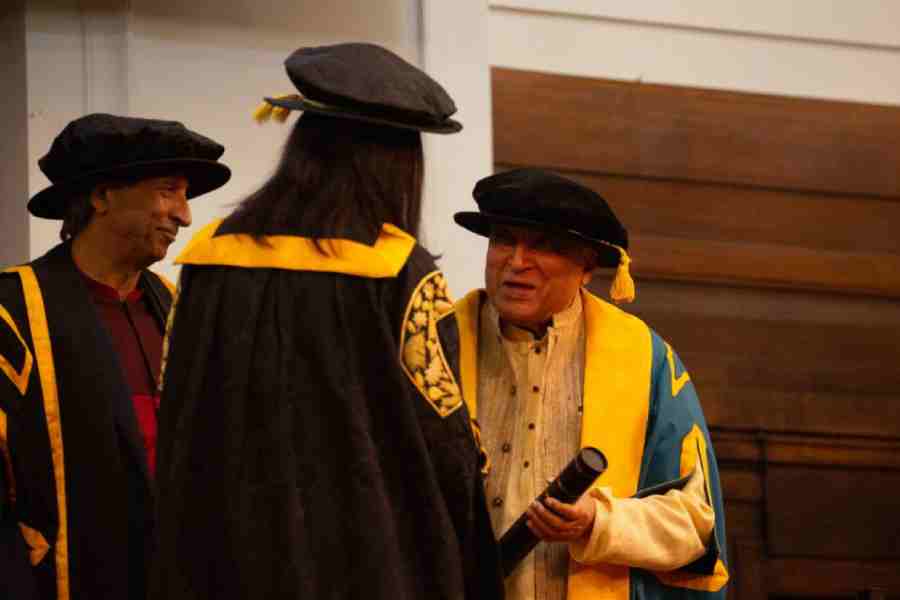Screenwriter and lyricist Javed Akhtar spoke of the power of poetry when he was given an honorary degree by the School of Oriental and African Studies in London.
Without mentioning any names, he said: “Is it just a coincidence that the fascist ideologies have not been able to produce one major poet? That is because poetry is the language of love, peace, justice and equality.”
In his acceptance speech, Akhtar began by saying: “We are living in the era of post-truth where we arrive at conclusions before searching for logic and reason.
“Where favourable laws for the powerful corporates are called effort for development.
“Where greed to take over oil resources of some places is called war on terrorism.
“Subjugating and stripping a woman of all her rights is called protecting her dignity and chastity.
“Where hating the minorities is the ultimate proof of one’s patriotism.”
Akhtar, who was accompanied by his wife and actor Shabana Azmi, went on: “We are living in a world where all the means of information and communication, one after another, are falling in the hands of the powerful.
“So in these times many people are discontented, unhappy and frustrated and that is why they are looking towards religion or its second line of defence — spiritualism and Sufism. One must accept they provide solace to an average person by making them look away from day-to-day realities. They give you painkillers to relieve your pain, not to heal the injury, they never challenge the status quo.
“On the other hand, poetry provides you with the music of language, pleasure and solace. But at the same time sensitises you to the pain and deprivation of the world. Take a look at the poets of the twentieth century, from one end of the world to another, you will see poets have turned their pens into swords, to battle the evil forces of the world. Be it Pablo Neruda of Chile, Mahmood Darvesh of Palestine, Breyten of South Africa, in India, Nazrul from Bengal and Faiz from Punjab (now in Pakistan).”
He posed the question: “Are such poets required today? The answer is a big ‘yes’.”
He added: “Actually with great pride I must tell you that in India, in the late thirties, there was a literary movement which lasted till the sixties. The Progressive Writers Movement was a pan-Indian movement in which the authors and
poets consciously passed a resolution undertaking the responsibility to write against colonialism, economic exploitation and encourage women empowerment.”
Akhtar concluded: “This movement created great literature but I have reservations about the word ‘responsibility’. Responsibility is most often an imposition, I believe it is not the duty but the right of every writer and poet to raise their voice.”
Akhtar said: “I hope that such patronage and felicitation of poets and writers will encourage them to fully claim their right to speak and write and challenge the status quo to usher in social change in the world.”
The citation for Akhtar’s honorary award of Doctor of Literature last week was read by Naresh Sharma, senior lecturer in Urdu and Hindi for SOAS’s School of Languages, Cultures and Linguistics, who said: “If you (want to) know anything about Bollywood cinema, and you have not heard about this guy, look up his back catalogue — you will be amazed!
“Beyond cinema, Javedsaab is a prominent Urdu poet with collections like Tarkash and Lava, writing verses of profound social relevance whilst pushing the boundaries of Urdu poetry.
“Javedsaab has also made significant contributions to politics and social activism, serving in the Rajya Sabha and championing the Copyright Amendment Act of 2012 — described as 'revolutionary', it secured royalties for lyricists and composers.
“Beyond this, he has been a leading voice in social justice campaigns, promoting gender equality, communal harmony, and opposing religious extremism.”











